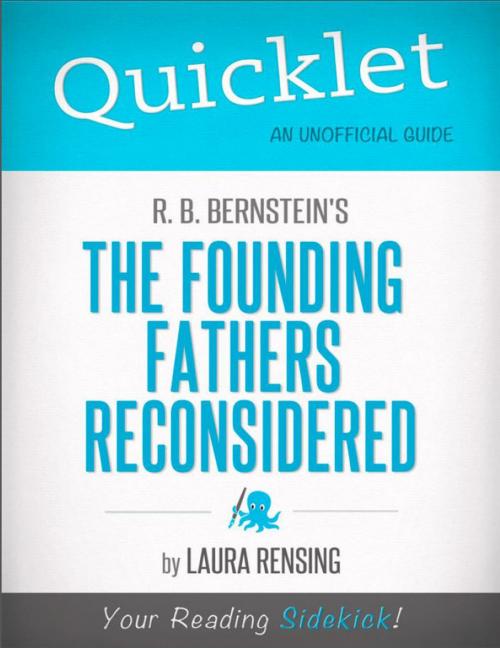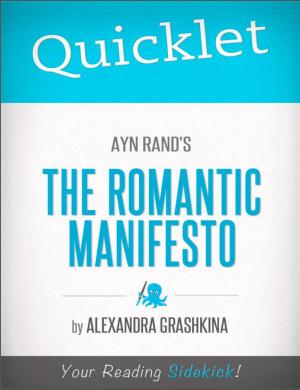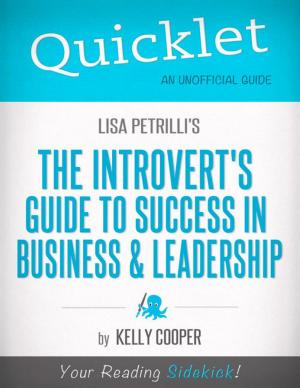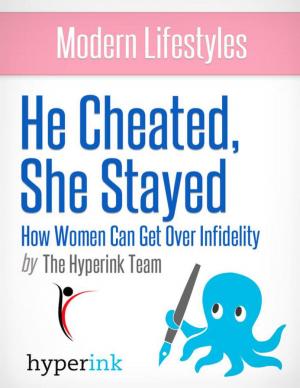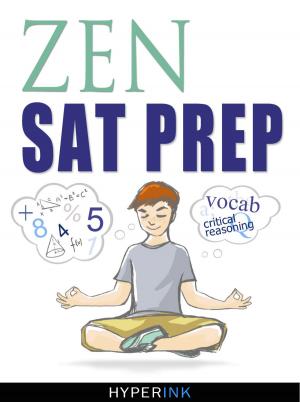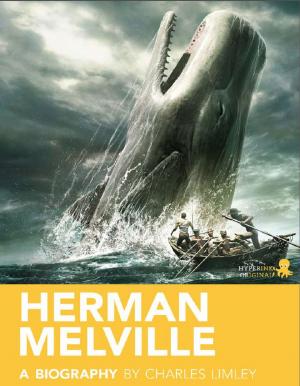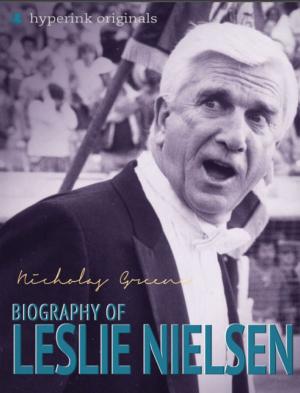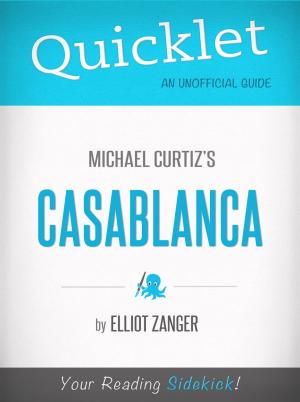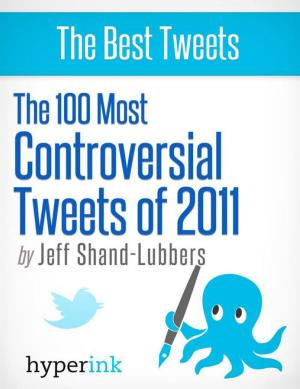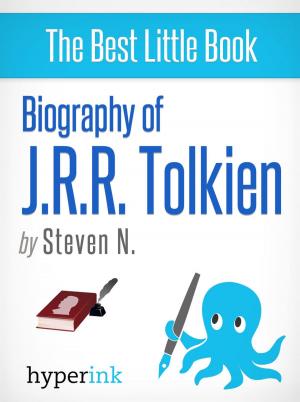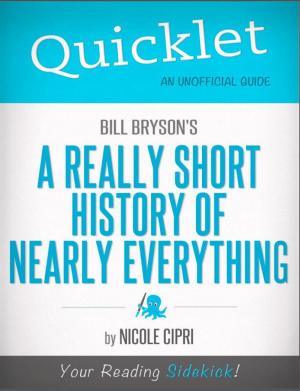Quicklet on R. B. Bernstein's The Founding Fathers Reconsidered (CliffNotes-like Book Summary)
Nonfiction, Reference & Language, Study Aids, Book Notes, Art & Architecture, General Art| Author: | Laura Rensing | ISBN: | 9781614647546 |
| Publisher: | Hyperink | Publication: | March 12, 2012 |
| Imprint: | Hyperink | Language: | English |
| Author: | Laura Rensing |
| ISBN: | 9781614647546 |
| Publisher: | Hyperink |
| Publication: | March 12, 2012 |
| Imprint: | Hyperink |
| Language: | English |
Quicklets: Your Reading Sidekick!
ABOUT THE BOOK
The founding fathers can mean something different to everyone: for many of us, theyre a subject best left in our eleventh grade high school history class. For others, the founding fathers are demigods of democracy. Still others view the founders as idolized symbols of an idealistic government that exists only in WWII Nationalist Propaganda or Captain America blockbusters. R.B. Bernsteins book, The Founding Fathers Reconsidered, asks us to open our minds to a completely different (and somewhat scandalous) option: that the founding fathers were human.
The book looks in detail at the hidden objectives, underlying goals, and twisting power plays that made up the American Revolution, the War of 1812 (often referred to as the Second War for Independence), and the creation of the government of the newborn nation. His research reveals the strengths of such near-mythological figures as George Washington, Thomas Jefferson, Alexander Hamilton, Benjamin Franklin to name a few. More importantly, he reveals the often glossed-over weaknesses that time (and overly-glorified school textbooks) have erased from the character study of the founders.
MEET THE AUTHOR
Laura Rensing is a writer and performer who occasionally has difficulty distinguishing fact from her pet fire-breathing dragon. A graduate of UC Irvine with dual degrees in Drama and Comparative Literature, Lauras experience onstage and on paper has given her a unique world view that allows her to move from present day politics to medieval literature at the drop of a pen. Dont let her frivolous tone fool you: her analysis of Public Sphere Theory in social media during the 2008 Presidential Election as well as her experience in local start-ups reveal that her critical thinking can be as daring as Lady Gagas latest Grammy appearance.
EXCERPT FROM THE BOOK
Its easy to imagine the American Revolution as one big Boston Tea Party, in which all the colonists were eager participants. However, the reality is that the revolution was unpopular on both sides of the pond, and one-third of the colonists did not fight for the patriots. In fact, there were more American colonists fighting with the British than against them.
Even the most courageous of the founders were more interested in preserving good relations between the colonies in England. According to historical record, many of the early so-called patriots had anything but a revolution in mind at the start of the ruckus. In fact, Colonial protest started out as simple complaints to Parliament not a direct attack on the monarchy (though England felt it to be so). Most of the colonialists thought fondly of England and enjoyed the status of their connection to the Great Empire including the founders.
Benjamin Franklin used his status as a distinguished inventor and scientist (having just successfully performed his experiment with lightning) to establish himself in British politics, and lived in London for seven years, while John Adams wore...
Buy a copy to keep reading!
CHAPTER OUTLINE
R. B. Bernstein's The Founding Fathers Reconsidered
+ About the Book
+ About the Author
+ Meet the Founders
+ Overall Summary
+ ...and much more
Quicklets: Your Reading Sidekick!
ABOUT THE BOOK
The founding fathers can mean something different to everyone: for many of us, theyre a subject best left in our eleventh grade high school history class. For others, the founding fathers are demigods of democracy. Still others view the founders as idolized symbols of an idealistic government that exists only in WWII Nationalist Propaganda or Captain America blockbusters. R.B. Bernsteins book, The Founding Fathers Reconsidered, asks us to open our minds to a completely different (and somewhat scandalous) option: that the founding fathers were human.
The book looks in detail at the hidden objectives, underlying goals, and twisting power plays that made up the American Revolution, the War of 1812 (often referred to as the Second War for Independence), and the creation of the government of the newborn nation. His research reveals the strengths of such near-mythological figures as George Washington, Thomas Jefferson, Alexander Hamilton, Benjamin Franklin to name a few. More importantly, he reveals the often glossed-over weaknesses that time (and overly-glorified school textbooks) have erased from the character study of the founders.
MEET THE AUTHOR
Laura Rensing is a writer and performer who occasionally has difficulty distinguishing fact from her pet fire-breathing dragon. A graduate of UC Irvine with dual degrees in Drama and Comparative Literature, Lauras experience onstage and on paper has given her a unique world view that allows her to move from present day politics to medieval literature at the drop of a pen. Dont let her frivolous tone fool you: her analysis of Public Sphere Theory in social media during the 2008 Presidential Election as well as her experience in local start-ups reveal that her critical thinking can be as daring as Lady Gagas latest Grammy appearance.
EXCERPT FROM THE BOOK
Its easy to imagine the American Revolution as one big Boston Tea Party, in which all the colonists were eager participants. However, the reality is that the revolution was unpopular on both sides of the pond, and one-third of the colonists did not fight for the patriots. In fact, there were more American colonists fighting with the British than against them.
Even the most courageous of the founders were more interested in preserving good relations between the colonies in England. According to historical record, many of the early so-called patriots had anything but a revolution in mind at the start of the ruckus. In fact, Colonial protest started out as simple complaints to Parliament not a direct attack on the monarchy (though England felt it to be so). Most of the colonialists thought fondly of England and enjoyed the status of their connection to the Great Empire including the founders.
Benjamin Franklin used his status as a distinguished inventor and scientist (having just successfully performed his experiment with lightning) to establish himself in British politics, and lived in London for seven years, while John Adams wore...
Buy a copy to keep reading!
CHAPTER OUTLINE
R. B. Bernstein's The Founding Fathers Reconsidered
+ About the Book
+ About the Author
+ Meet the Founders
+ Overall Summary
+ ...and much more
